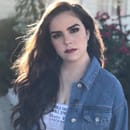It’s October 25th. I’m at the Chappell Roan concert at The Beacham in Orlando, Florida. I’m huddled up with friends, my makeup fully decked out and dressed to the theme as a little devil, reveling in the crowd of “angels” with sky-high wings and “devils” in 7-inch Demonias. And for the first, and definitely not the last time, I fell in love with Queer Pop.
Ok, let me explain what “Queer Pop” even is.
For the longest time, musicians kept any sexuality that wasn’t straight away from the media eye. George Michael, despite being a prominent sex symbol in the 80s and 90s, was a casualty of this culture and was cruelly outed to the globe. Anything other than cisgender, heterosexual desire either made up the underground or indie sound or was used as a catchy line for an already-established pop star to get some controversial attention. Take for example Katy Perry, who while actively being a prominent ally to the queer community, had two mishaps in the early 2000s with songs like “I Kissed a Girl” and “Ur So Gay” being criticized for alleged fetishization of lesbians or homophobic imagery, respectively.
And for a while, that was the extent of Queer Pop. Lyrics that would make us cringe today or sexualities being forced into the closet.
Then in the 2010s, there was an explosion of queer artists dominating the pop scene. R&B artist and 2023 Coachella headliner Frank Ocean was one of the first few to come out and be honest about their sexuality. Halsey’s “Bad At Love,” a song explicitly about bisexuality, made it to the Billboard Top 5. Then there was Hayley Kiyoko, Demi Lovato, Kehlani, Kesha, and more.
Queer Pop describes the beautiful subgenre whereby musicians can freely write, create, and direct songs or entire albums that embrace their sexuality and who they love. It offers the ability to openly talk about loving differently, coming to terms with sexuality, and what that feels like in an even more divisive world.
Queer Pop today, however, has taken that baton and ran with it. Gender expression has entered the conversation and performance art such as drag is being seen more and more on the stage.
As previously mentioned, Chappell Roan is one of these artists charging forward with overt queer expression. Her latest album, The Rise and Fall of a Midwest Princess, chronicles her journey of sexuality, gender expression, and is unabashedly queer. A song off the album, “Pink Pony Club,” has become one of the unofficial anthems of the LGBTQ+ community, with lyrics like “And I heard that there’s a special place/ Where boys and girls can all be queens every single day” echoing the sentiments of young people finding their place in gay clubs like the fictional Pink Pony Club or the real club the song is based on, The Abbey.
Roan’s stage presence further carries this vibe. Her tour, “The Midwest Princess Tour,” incorporates and encourages elements of drag like themed nights, (Orlando’s was Angels vs Devils!) eccentric and sexually liberating costumes, bright and beautiful makeup, as well as bringing on and supporting local drag artists to open the night with every performance.
Now, Chappell Roan is opening for Olivia Rodrigo on the “Guts World Tour” and performing at Coachella this year. Watching her perform on the Colbert Late Show felt like watching decades of queer history, activism, and artists culminate in musicians finally having the freedom to be who they are on stage.
And Chappell is really just the beginning.
Troye Sivan, a prominent figure in Queer Pop since the release of his debut album Blue Neighborhood back in 2015, fully embraced drag (and honestly how futile the gender binary is) by donning a full Brittany Spears-esque idol-type persona alongside heartthrob Ross Lynch in the music video for “One of Your Girls.” The song and video not only perfectly encapsulate the feeling of changing yourself and your gender expression to gain the attention of a crush, but it also brings to mainstream media a depiction of drag that isn’t clouded by homophobia or transphobia. This is especially important as states nationwide are passing laws that directly attack the beautiful medium of art and expression that is drag.
Lastly, I want to talk about the recent Madonna Celebration Tour. Opening the tour is the winner of the 8th season of RuPaul’s Drag Race, Bob The Drag Queen. For me, both immense pride and a full circle feeling awaken in me when I’m watching them on stage in full French Rococo costume, lip-syncing along to Madonna’s hit “Vogue,” a word that also describes the distinctly queer dance style used amongst drag and queer ballroom culture.
I’m so proud and excited for the future of queer artists after seeing performances like these. I’m obsessed with Queer Pop not just because their songs are bangers, but because the performances are so honest, the lyrics tug on the heartstrings, and the genre is overall a fun, welcoming, and liberating place to be.


